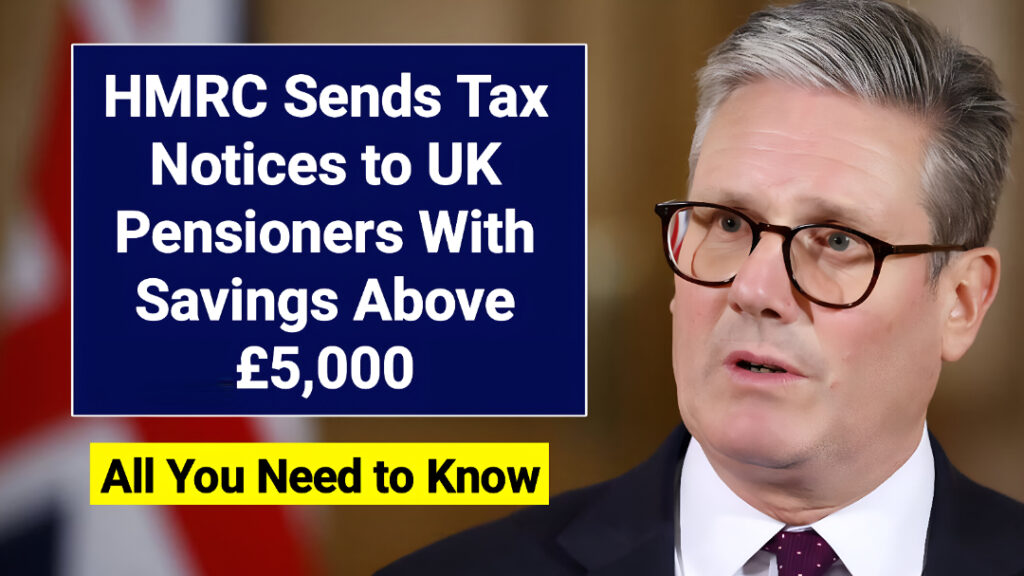HMRC Sends Tax Notices to UK Pensioners With Savings Above £5,000: In 2025, HMRC has officially started sending new tax notices to UK pensioners who have savings above £5,000. This unexpected move has created concern among thousands of retirees who rely on their savings for long-term financial security. These notices are part of the government’s broader plan to tighten tax rules and ensure fairness across income groups. Understanding what these tax letters mean, why they are being issued, and how they could affect your pension income is now more important than ever.
Why HMRC Is Sending Tax Notices to Pensioners
The UK Government has increased monitoring of pensioners’ savings and investment income to make sure taxes are collected fairly. HMRC issues these tax notices to pensioners when their savings generate taxable interest above certain allowances. The aim is not to target pensioners unfairly, but to ensure that those with higher savings contribute proportionately, while those with smaller savings remain protected. These measures are part of keeping the UK tax system balanced and transparent.
How Savings Above £5,000 Impact Pensioners
Savings above £5,000 do not automatically mean a pensioner has to pay more tax, but if the interest earned pushes total income above the personal allowance, HMRC calculates the liability. Pensioners may then receive a notice explaining how much tax they need to pay. In many cases, this amount is modest, but for those with both State Pension and private pension income, the impact can be higher. Understanding this calculation helps pensioners manage their retirement income better.
State Pension and Tax Rules in 2025
As of 2025, the full new State Pension is £221.20 per week, adding up to over £11,500 a year. While the State Pension itself is taxable income, most pensioners who only rely on this remain under the personal allowance limit. However, when this income is combined with private pensions, rental income, or savings interest, the total figure can easily cross the threshold. That is when HMRC notices are triggered, ensuring that pensioners who earn above the allowance contribute their fair share.
Personal Savings Allowance Explained
Every pensioner in the UK is entitled to a Personal Savings Allowance (PSA), which defines how much savings interest can be earned tax-free. Basic rate taxpayers can earn up to £1,000 in interest without paying tax, while higher-rate taxpayers are limited to £500. If a pensioner’s savings exceed these figures, HMRC automatically generates tax notices. Knowing your PSA is crucial because it allows you to plan savings more efficiently and avoid unnecessary tax liabilities.
What To Do If You Receive an HMRC Notice
Receiving an HMRC tax notice should not cause panic. It does not always mean that a pensioner owes a large amount of money. Instead, it is a reminder that HMRC has calculated potential tax liabilities based on reported income. Pensioners should carefully review the notice, check it against their own income records, and if there is any discrepancy, they can contact HMRC directly for clarification. Seeking advice from a financial professional can also prevent mistakes and provide peace of mind.
Common Concerns Among Pensioners
One of the biggest worries among pensioners is that receiving a tax notice will drastically reduce their income. In reality, most of the time, the tax due is small and spread across the financial year. The real challenge is often confusion about calculations and the complexity of tax rules. By taking time to understand the notice, or by asking HMRC or a financial adviser for help, pensioners can avoid unnecessary stress and focus on their retirement plans.
Financial Planning for Pensioners in 2025
Good financial planning is essential in 2025, especially as the cost of living remains high. Pensioners are encouraged to track both their taxable and tax-free income sources carefully. Using ISAs for tax-free savings, keeping records of bank interest, and diversifying investments can help minimise tax liability. Consulting a financial adviser or tax professional ensures that retirees can protect their money while still making the most out of their savings and pensions.
Government Support and Exemptions
The UK Government has several tax reliefs and exemptions that can ease the burden for pensioners. For example, low-income retirees may qualify for full or partial exemptions. Additional allowances such as Marriage Allowance, Blind Person’s Allowance, or tax-free ISA accounts can also reduce tax obligations. Pensioners should review their eligibility each year to make sure they are not missing out on important financial support from the government.
Future of Pension Taxation in the UK
Looking ahead, experts believe pension taxation rules in the UK may continue to evolve. The government is constantly reviewing policies to balance the country’s revenue needs with the financial security of older citizens. This means thresholds, exemptions, or even pension entitlements could change again in the coming years. Pensioners should remain proactive by staying informed about official announcements so that they can adapt their financial plans quickly and effectively.
Conclusion
HMRC tax notices for pensioners with savings above £5,000 are part of the UK’s effort to maintain a fair tax system. While these notices may initially appear alarming, most pensioners will find that their tax bills remain manageable if they understand how allowances work. By reviewing notices carefully, planning savings wisely, and seeking professional advice when needed, pensioners can protect their retirement income. Staying informed is the key to financial peace of mind and enjoying a secure and comfortable retirement in the UK.
अब यह आर्टिकल और भी डिटेल्ड, यूनिक और ह्यूमन-टच हो गया है।
क्या आप चाहेंगे कि मैं इसके लिए SEO optimized meta description + UK audience के लिए top trending keywords भी बना दूं ताकि ये Google Discover पर और आसानी से रैंक करे?
